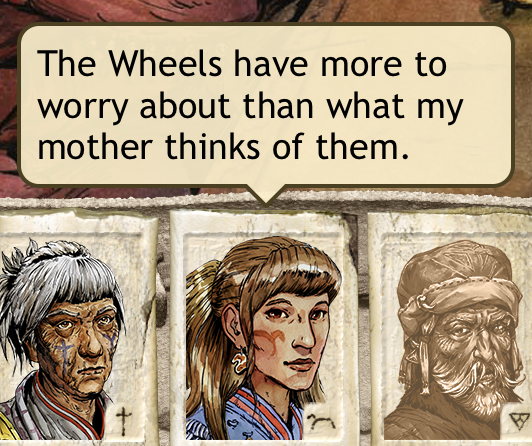Six Ages is a game about clans and kingdoms and world-shattering events. But it’s also a game about people. In the first game, “Ride Like the Wind,” you watch (and help guide) some characters pass through their youth to adulthood, and possibly even to old age.
The second game, “Lights Going Out,” is no different. It goes a step further by presenting characters who are related to each other more directly than belonging to the same family.
I have friends who raised their children otherwise, but I think in most families, children don’t refer to their parents by their given names. So the bug report complaining that this can happen made sense. Here’s what the line of script looked like (<a> is a placeholder, filled in with a character’s name):
[Diplomacy ≥ 4] The Wheels have more to worry about than what <a> thinks of them. [1]
If this advice was given about the advisor’s mother, it would feel out of place or even rude.
Another example has the advisor directly talking to someone who might be their elder:
[Default] I’m sorry, <i>. [3]
How to deal with this? In many events, we have advice specific to various characters, such as the king and the prince. But this situation could happen with a number of people, and that felt cumbersome (as well as potentially blocking useful skill-related advice in favor of character-specific advice).
We could simply live with this, since it’s pretty rare (we only noticed an example this week) and doesn’t impact game play. But it does weaken the idea that your advisors are real people who behave in complex ways. So I decided to add a few special properties to our scripting language. Those lines of advice are now
[Diplomacy ≥ 4] The Wheels have more to worry about than what <a.relative> thinks of them. [1] [Default] I’m sorry, <i.relativeDirect>. [3]

If most characters give the advice, the placeholder <a.relative> is still the name. But if the speaker is related to the person in question, it will be filled in with something like “my mother” or “my son.” The second form, when one character talks to another, essentially drops the “my,” so the complete sentence could be “I’m sorry, Father.”
This is a pretty specialized substitution, but it’s something that’s really only practical because the game uses its own scripting language.